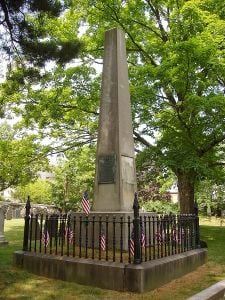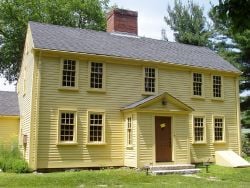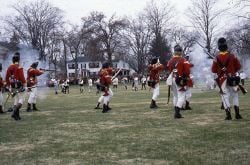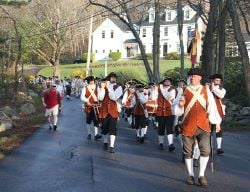| Patriots' Day | |
|---|---|
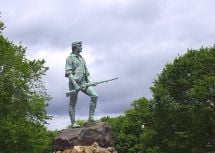
| |
| Statue of the Lexington Minuteman on the Lexington Green in Lexington, Massachusetts | |
| Observed by | Massachusetts Maine Wisconsin Connecticut (since 2018) North Dakota (since 2019)[1] Encouraged in Florida |
| Type | Historical |
| Date | Third Monday in April |
| Celebrations | Boston Marathon |
| Observances | Battles of Lexington and Concord and Menotomy |
Patriots' Day (so punctuated in several U.S. states, but Patriot's Day in Maine) is an annual event, formalized as several state holidays, commemorating the Battles of Lexington and Concord, and the Battle of Menotomy, the first battles of the American Revolutionary War.
The day is observed by re-enactments of the battles and the famous rides of Paul Revere and William Dawes, as well as sporting events including the Boston Marathon and a Red Sox baseball game at their home ballpark, Fenway Park, in Boston.
Observance
The holiday was originally celebrated on April 19, the actual anniversary of the battles (fought in 1775). Since 1969, it has been observed on the third Monday in April in Massachusetts[2] and in Maine[3] (which until the Missouri Compromise of 1820 was part of Massachusetts). The Monday holiday creates a three-day long weekend.
The day is a public school observance day in Wisconsin.[4] Florida law also encourages people to celebrate it, though it is not treated as a public holiday.[5] On April 16, 2018 Connecticut became the fourth state to recognize the holiday, Governor Dannel Malloy having signed a bill establishing the unpaid state holiday in 2017.[6] On April 15, 2019, North Dakota became the first Western state to adopt Patriots' Day as a holiday.[1]
History
Patriots' Day was first proclaimed in Massachusetts in 1894 by Governor Greenhalge, replacing Fast Day as a public holiday.[7] The idea was introduced to the Governor by the statesman from Lowell, Isaac Henry Paige. It was established on April 19, commemorating the date of the Battles of Lexington and Concord and the larger Battle of Menotomy in 1775, and consolidating the longstanding municipal observances of Lexington Day and Concord Day. It is likely that the battles that took place in Menotomy (now Arlington), where 25 militia men died and 40 British soldiers were killed,[8] are not as well known as the smaller battles in Lexington and Concord because the town has had several names since that day in 1775. In 1938, the Massachusetts legislature passed a bill establishing the holiday "in commemoration of the opening events of the War of the Revolution."[9]
Maine followed Massachusetts in 1907 and replaced its Fast Day with Patriot's Day.[7]
On June 10, 2017, Governor Dannel Malloy signed a bill establishing Patriots' Day as a statewide unpaid holiday in Connecticut, and on April 16, 2018 towns in Connecticut celebrated their first Patriots' Day.[6]
On April 15, 2019, North Dakota became the fourth state, and first Western state, to adopt Patriots' Day as a holiday.[1]
History of Fast Day
Fast Day was a holiday observed in some parts of the United States between 1670 and 1991. The earliest known Fast Day proclamation was in Boston on September 8, 1670, while New Hampshire held their first Fast Day in early 1680. "A day of public fasting and prayer," it was traditionally observed in the New England states, having its origin in days of prayer and repentance proclaimed in the early days of the British American colonies by Royal Governors, to avoid such calamities as plagues, natural disasters, or crop failures. Fast Days were commonly held before the spring planting, and observance included church attendance, fasting, and abstinence from secular activities.[10]
Fast Day had lost its significance as a religious holiday by the late nineteenth century. It was abolished by Massachusetts in 1894. The Lexington Historical Society petitioned the Massachusetts State Legislature to proclaim April 19 as "Lexington Day." Concord countered with "Concord Day." However the biggest battle fought on this day was in the town of Menotomy, now Arlington, Massachusetts. Governor Frederic T. Greenhalge opted for a compromise, replacing the state's Fast Day, celebrated on the third Monday in April, with Patriots' Day. [8]
Maine, which also celebrated Fast Day on the third Monday in April, changed it to Patriot's Day (note different punctuation) in 1907.[7] Fast Day continued in New Hampshire until 1991, with the late April holiday signifying only the opening of the summer tourist season; the state dropped Fast Day in 1991, replacing it with the January Civil Rights Day, which they renamed Martin Luther King, Jr. Day (the last U.S. state to do so) in 1999.[10]
Battles of Lexington and Concord
The Battles of Lexington and Concord were the first military engagements of the American Revolutionary War. They were fought on April 19, 1775, in Middlesex County, Province of Massachusetts Bay, within the towns of Lexington, Concord, Lincoln, Menotomy (present-day Arlington), and Cambridge, near Boston. The battles marked the outbreak of open armed conflict between the Kingdom of Great Britain and its thirteen colonies in the mainland of British North America.
Several hundred British Army regulars, under Lieutenant Colonel Francis Smith, were ordered to capture and destroy military supplies that were reportedly stored by the Massachusetts militia at Concord. The Patriot colonists had received intelligence weeks before the expedition which warned of an impending British search, and had moved most of the supplies to safety. They had also received details about British plans on the night before the battle, and information was rapidly supplied to the militia.
The first shots were fired at sunrise Lexington. The militia were outnumbered and fell back. Other British colonists, hours later at the North Bridge in Concord, fought and defeated three companies of the British troops. The outnumbered soldiers of the British Army fell back from the Minutemen after a pitched battle in open territory.
More Minutemen arrived soon thereafter and inflicted heavy damage on the British regulars as they marched back towards Boston. The occupation of surrounding areas by the Massachusetts Militia that evening marked the beginning of the Siege of Boston.
The battles, particularly the skirmish at the North Bridge, are known as the "shot heard 'round the world," described in Ralph Waldo Emerson's Concord Hymn.
Battle of Menotomy
The village of Menotomy (now Arlington) was on the Concord Road between Lexington and Concord and Boston. While the fighting was going on in Lexington and Concord, 5,100 militia men arrived in Menotomy from Middlesex and Essex Counties.[11][8] These men took up positions along the road the British troops would take on their retreat to Boston.[11] They placed themselves in and around houses, stone walls, fields, and barns. The bloodiest fighting of the first day of the American Revolution took place inside a single house, the Jason Russell House, in Menotomy.[11] Eleven militia men died in this house fighting British troops trained in bayonet fighting.[8]
Activities
Observances and re-enactments of the battles occur annually at Lexington Green in Lexington, Massachusetts (around 6:00 am) and the Old North Bridge in Concord, Massachusetts (around 9:00 am) and in Arlington, Massachusetts on the Sunday before Patriot's Day. Tours are available of the Jason Russell House in Arlington, Massachusetts on Sunday and Monday.[12]
The National Lancers re-enact the rides of Paul Revere and William Dawes, beginning Sunday night with a service at the Old North Church. On Monday morning Revere leaves from the North End, Boston, and Dawes leaves from John Elliot Square in Roxbury, warning the people while on their way to Lexington.[13]
The most significant celebration of Patriots' Day is the Boston Marathon. The race links the Athenian and American struggles for liberty.[9]
Sporting events
The Boston Marathon is run on Patriots' Day every year, since its inception on April 19, 1897, even during the World War years.[9] Therefore, sometimes the holiday is referred to as "Marathon Monday."[14] However, due to the COVID-19 pandemic, the 2020 Boston Marathon was initially rescheduled to September,[15] and ultimately canceled.[16]
The Boston Red Sox baseball team have been scheduled to play at home in Fenway Park on Patriots' Day every year since 1959. The game was postponed due to weather in 1959, 1961, 1965, 1967, 1984, and 2018, and was canceled in 1995 because of the baseball strike. The game was played in 2013 despite the Boston Marathon bombing because it had finished before the bombs went off. From 1968 to 2006 the games started early, in the morning, around 11:00 am. The early start to these games usually resulted in the game ending just as the marathon was heading through Kenmore Square. However, since 2007 the marathon was started between 9:30 am and 10:00 am, resulting in the racers going through Kenmore in the middle of the Red Sox game.[17]
Notes
- ↑ 1.0 1.1 1.2 David Olson, North Dakota first western state to have a Patriots' Day InForum, April 15, 2019. Retrieved November 30, 2020.
- ↑ Massachusetts Legal Holidays Secretary of the Commonwealth of Massachusetts. Retrieved December 9, 2020.
- ↑ Patriot's Day in the United States Timeanddate. Retrieved December 9, 2020.
- ↑ Patriots' Day - 2020 Wisconsin Department of Public Instruction.
- ↑ §683.14 Patriots' Day The 2020 Florida Statutes. Retrieved December 9, 2020.
- ↑ 6.0 6.1 Jim Kinney, Patriots' Day 2018: What's open, what's closed, details on extended tax deadline, Boston Marathon, MBTA service and more MassLive, April 16, 2018, updated September 17, 2019. Retrieved December 10, 2020.
- ↑ 7.0 7.1 7.2 Susan McMillan, Patriot's Day or Patriots' Day? Punctuation confusion continues Kennebec Journal, April 20, 2014. Retrieved December 11, 2020.
- ↑ 8.0 8.1 8.2 8.3 Thomas Fleming, Battle of Menotomy - First Blood, 1775 HistoryNet. Retrieved December 11, 2020.
- ↑ 9.0 9.1 9.2 Yoni Appelbaum, Why Does Boston Hold a Marathon on Patriot's Day? The Atlantic, April 17, 2013. Retrieved December 11, 2020.
- ↑ 10.0 10.1 Donna Gilbreth, Rise and Fall of Fast Day New Hampshire State Library, 1997. Retrieved December 11, 2020.
- ↑ 11.0 11.1 11.2 The Battle of Menotomy Arlington Historical Society. Retrieved December 11, 2020.
- ↑ Jason Russell House Arlington Historical Society. Retrieved December 11, 2020.
- ↑ Patriot's Day Events National Lancers. Retrieved December 11, 2020.
- ↑ Levan Reid, Who To Watch on Marathon Monday CBS Boston, April 17, 2015. Retrieved December 11, 2020.
- ↑ David Abel and Tim Logan, Boston Marathon postponed to September due to coronavirus The Boston Glob, March 13, 2020. Retrieved December 11, 2020.
- ↑ Jimmy Golen, Boston Marathon canceled for 1st time in 124-year history Associated Press, May 28, 2020. Retrieved December 11, 2020.
- ↑ Gordon Edes, Patriots Day game to start even earlier The Boston Globe, December 22, 2006. Retrieved December 11, 2020.
ReferencesISBN links support NWE through referral fees
- Bradford, Charles H. The Battle Road: Expedition to Lexington and Concord. Ft. Washington: Eastern National Park & Monument Association, 1988. ISBN 978-1888213010
- Fleming, Thomas. The First Stroke: Lexington, Concord, and the Beginning of the American Revolution. University Press of the Pacific, 2005. ISBN 978-1410223067
- Galvin, John R. The Minute Men: The First Fight : Myths and Realities of the American Revolution. Brassey's, 1989. ISBN 978-0080367330
- Kollen, Richard P. The Patriot Parson of Lexington, Massachusetts. The History Press, 2016. ISBN 978-1467135382
- Varney, Geo. J. The Story of Patriots' Day: Lexington and Concord, April 19, 1775. Forgotten Books, 2018. ISBN 978-1331064855
External links
All links retrieved November 2, 2025.
- Battle Road Commemorating the Battles of Lexington and Concord - April 19, 1775.
- The Battle of Menotomy Arlington Historical Society
- Battle of Menotomy – First Blood, 1775 HistoryNet
- What is Patriots’ Day? History.com
- Patriot's Day in the United States TimeandDate.com
| |||||||
Credits
New World Encyclopedia writers and editors rewrote and completed the Wikipedia article in accordance with New World Encyclopedia standards. This article abides by terms of the Creative Commons CC-by-sa 3.0 License (CC-by-sa), which may be used and disseminated with proper attribution. Credit is due under the terms of this license that can reference both the New World Encyclopedia contributors and the selfless volunteer contributors of the Wikimedia Foundation. To cite this article click here for a list of acceptable citing formats.The history of earlier contributions by wikipedians is accessible to researchers here:
The history of this article since it was imported to New World Encyclopedia:
Note: Some restrictions may apply to use of individual images which are separately licensed.
